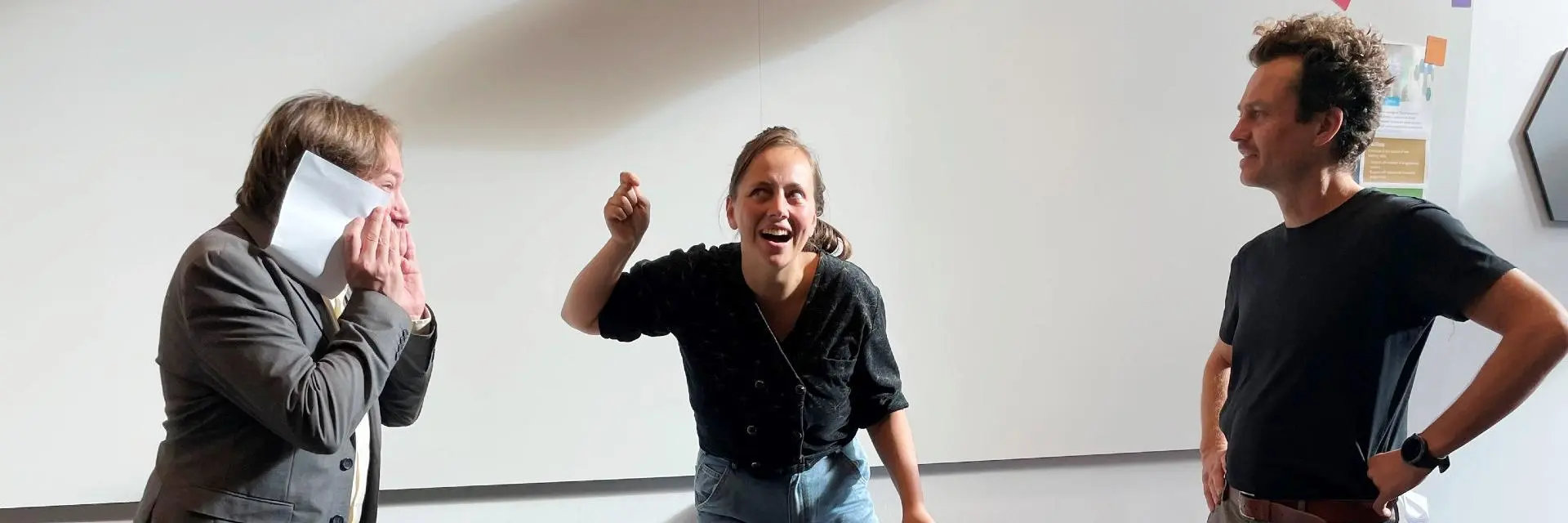Text by Barbara Koole
Conflict can be a good thing. That is CONTRA’s point of departure, CONTRA standing for Conflicts in Transformations. Amongst others, conflicts can make sure that different perspectives on problems can be heard and urgency for policy-making created. In the context of climate change combat and adaptation, an increasing amount of conflicts are happening and expected to grow in the crucial coming decades. Our question is how such climate-related conflicts can be had in a more productive way and provide grounds for dialogue.
Especially, we will look into the role that theatre can play in improving the ways in which we have conflicts. We expect that theater can make it possible to improve conflicts because it can enable dialogues and spark peoples’ imagination. Art does not have to abide by academic rules of conduct and therefore offers freedom that academics normally do not have. Since theater is an essentially social and political form of art, as Hannah Arendt already noted, we feel that this art discipline is exceptionally well-suited to work within the context of climate change conflicts, that are often highly divisive and emotional. Within CONTRA, we therefore partner up with professional theatre makers to intervene in the conflicts that we study with theatre-methods.
On the 19th of September the CONTRA university partners from Belgium, the Netherlands, Norway and Poland gathered at Tilburg University for a kick-off week. Whilst planning for this week we realized that we wanted to ‘practice what we preach’ and explore how cultural expression and theater could be involved in our collaboration. An obvious decision that we made early on was to visit a theatre play together, we were lucky enough that a dance performance about the climate catastrophe was being performed exactly during the time our international guests were in Tilburg. More on our theatre visit will follow soon in a separate blog post.
On the second day of our kick-off week, a day full of theoretical discussions was planned. To warm up for this, we first did a theatre improvisation exercise. During a warming up for this exercise everyone was asked to take of their shoes, which immediately created a different setting than the usual research meeting, behind a table with a laptop. Theatre requires our whole bodies to be present and can be a welcome variation to office work or meeting room work. Through some breathing exercises, meditation and movement we all got the opportunity to ‘arrive’ and to get rid of any shyness in this uncommon setting for most researchers.
Following the warming up, we did four subsequent improvisation exercises, each playing out a semi-realistic setting of climate change related conflict in an urban context. The setting was read out loud to the audience, and each player received a short description of their role and one sentence that they needed to include in the improvisation. For example, about a windmill that was planned to be built on an ‘empty’ plot of land that was currently used by children to play football and another story about an recycling initiative where people were concerned about bad smells. During the improvisation the players needed to make clear to the others ‘who they were’ and use their sentence. Each of the four exercises lasted around 5 minutes.
After the exercise a lot of laughs had been exchanged and also some recognizable scenes that may be expected to be found during our upcoming fieldwork had been performed. Altogether, the improvisation provided a good warm-up for the discussions that followed and also allowed for some group-building within the consortium.
On Thursday another theatre exercise was done, this time initiated by our Norwegian partners: the parliament of things. We were going to have a ‘parliament discussion’ about the flooding of Venice. We were first invited to consider which human and non-human actors (or actants) are involved in such an event. In this brainstorm, amongst others the citizens of Venice, tourists, the river, ancient pallazos, history and doves were identified as stakeholders. Each stakeholder was then represented by a small object, such as a lego puppet, a hairband or a stone. A circle of chairs was made and each of us needed to represent the voice of the object we were holding, and figure out a solution for the flooding of Venice. Quite soon, the river made clear that it just wanted to flow, whereas the pallazos and history wanted to create a dam that prevented the water from coming in. Later on in the discussion, a coalition formed between the citizens, the river and the pallazos against the doves.
The parliament of things did not result into a clear solution for the flooding of Venice, but did give us insight into non-human perspectives on a catastrophe like this. It also was a great example of the type of theatrical interventions that we may do with CONTRA in a ‘real’ climate conflict. Altogether, our kick-off week made us very excited for the project and to explore many more ways in which theatre can enable unusual dialogue and collaboration.








No responses yet